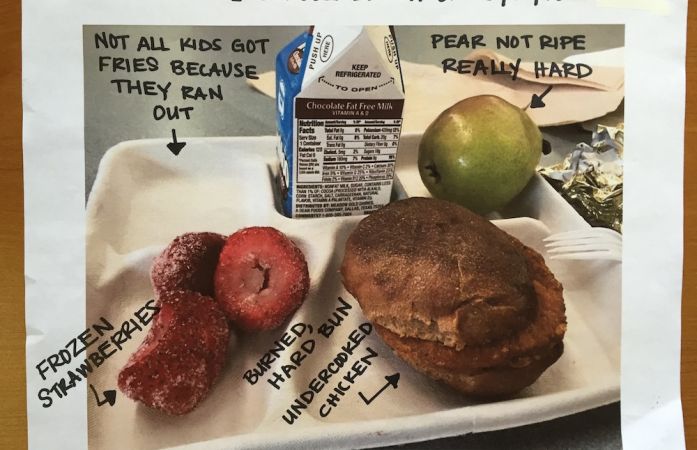‘It’s heartbreaking:’ Denver school board members get a taste of Michelle O lunches
DENVER – School district administrators in Denver recently got a taste of what students have been complaining about: a school lunch with a cold chicken patty on a rock-hard burnt bun, frozen strawberries and a “really hard” pear.
That was the meal served to school board member Rosemary Rodriguez at Kepner Middle School in Denver May 12, after Kepner student Stephanie Torres took her complaints about the food to the school board, Chalkbeat.org reports.
Aside from the unappetizing offerings, the cafeteria at Kepner ran out of at least one food item during the visit, which also included representatives from Padres & Jovenes Unidos – a social services organization.
“It’s heartbreaking,” Padres health justice organizer Monica Acosta said of the lunch prepared under federal food guidelines championed by first lady Michelle Obama. “That’s the type of food Kepner students have been having all year long.”
 The visit, however, did spur changes in Kepner’s cafeteria. Food workers now thaw the fruit, and no longer serve expired milk. School officials also plan to offer more choices in the future.
The visit, however, did spur changes in Kepner’s cafeteria. Food workers now thaw the fruit, and no longer serve expired milk. School officials also plan to offer more choices in the future.
Kepner Middle School and others in the district have also experienced a wave of negative feedback on the “Breakfast after the Bell” program implemented in 2013. That program is also subject to food nutrition laws imposed on schools in the National School Lunch Program as part of Obama school food overhaul.
Since the new limits on calories, fat, sugar, sodium, whole wheat, and other nutritional elements went into effect in 2012, at least 1.2 million students nationwide have dropped out of the National School Lunch Program in favor of packed lunches from home.
The changes also spawned massive food waste – roughly $1 billion per year – because of regulations that stipulate that all students must receive a fruit or vegetable each day, which most simply toss in the trash.
The waste has been a serious problem in many school districts, one of many reasons hundreds of U.S. schools have ditched the National School Lunch Program to serve students food they’ll actually eat.
“We’re trying to waste less food,” Greater Johnstown School District board president Paul VanDenburgh recently told the Leader Herald.
The district removed its Jansen Avenue School from the federal lunch program effective June 30 over complaints about waste, as well as the tight nutrition restrictions that have run the school’s lunch program into the red.
Greater Johnstown superintendent Robert DeLilli told school board members in a recent meeting the plan is to see how the Jansen lunch program improves without the federal restrictions before considering the move for other schools, as well.
“It’s kind of like a pilot to see how it works,” he said, according to the Leader Herald. “We’ll wait and see how it goes.”
Other schools are turning to recommended recipes from the U.S. Department of Agriculture to help prepare nutritious and tasty foods under the federal rules, but a recent survey shows those recipes don’t seem to be much help.
From the Washington Examiner:
The survey found that especially large school systems, representing 54 percent of all students, slammed many of the Agriculture Department’s 226 specially designed recipes because they didn’t meet “the trends of today,” and clashed with “cultural diversity.”
Worse, the survey published in the Journal of Child Nutrition and Management said the USDA’s suggested breakfast, lunch and snack recipes didn’t meet the department’s own demand for healthier foods, the goal of Obama’s Let’s Move! and Recipes for Healthy Kids initiatives.
“The majority of [school nutrition] directors perceived that the USDA recipes do not adequately support the following issues: menu planning for dark green vegetables and red/orange vegetables, and compliance with meal pattern specifications regarding ‘no added sugar,’ ‘no syrup,’ and ‘sodium,'” said the group’s latest survey.
VICTOR SKINNER
Victor is a communications specialist for EAG and joined in 2009. Previously, he was a newspaper journalist.
A special hat tip to EAG News Org. for the excellent work in exposing the madness now infecting our education system.

No comments:
Post a Comment